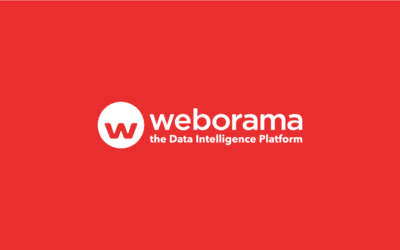With Google’s announcement last December that it would be implementing Tracking Protection mode, marking the elimination of third-party cookies from 1% of Chrome users from 4 January 2024, the digital advertising landscape is undergoing a major transformation.
On the eve of these major changes, Camille Bablet, Commercial Director, and Margarita Zlatkova, Weborama’s Director of Data & Programmatics, share their vision and Weborama’s strategic solutions for dealing with the imminent impact of the disappearance of third-party cookies in 2024.
How is Weborama’s Trading Desk doing?
CB: In contrast to the state of the digital advertising market, Weborama’s remarkable growth of over 10% in 2023 is testament to its agility and ongoing commitment to innovation in digital advertising. While the previous year was marked by record growth of 47%, the exceptional results underline our ability to successfully navigate an ever-changing environment. Our customers are very receptive to our cookieless activation solutions. In 2023, we achieved a customer retention rate of 88% and a budget renewal rate of 86% compared with 2022, and gained 35 new customers. But despite these encouraging results, we’re still a long way from 100% adoption, given the challenges involved in making the transition to cookieless. The market still needs education and real support to change the way they work.
What impact will the disappearance of third-party cookies in 2024 have on the activation and measurement of digital campaigns?
MZ: The end of third-party cookies is fragmenting the landscape. In the future, independent tools will be needed to provide a complete view of the open web.
With the scheduled end of third-party cookies in 2024, advertisers and media agencies are facing unprecedented challenges in terms of activating and measuring digital campaigns. Current solutions will no longer be universal. The Privacy Sandbox is being deployed by Google for activation and measurement in the Chrome ecosystem. Firefox and Safari, which account for around 40% of traffic, will not be adopting the Privacy Sandbox. We will need appropriate solutions for these ecosystems, based in particular on universal IDs.
The market will need to rely on a number of tools to activate and measure the Open Web as a whole.
The prospect of the end of third-party cookies is reshuffling the cards in the adtech market, as Google’s tools will no longer be able to do everything. For example, Google has already come out very clearly against the deployment of numerous features such as the collection of IP addresses and unique IDs, which will greatly limit advertisers’ room for manoeuvre.
How can Weborama solutions meet these challenges?
MZ: In 2024, semantic AI will be at the heart of activation strategies without third-party cookies. It’s clear that semantic contextual activation is the cookieless targeting solution that has come out on top, offering much better results than strategies based on third-party cookies. This approach has enabled us to deploy Branding and Performance campaigns in France and internationally, and to be a top performer on the vast majority of campaigns run on our Trading Desk.
But beyond our semantic AI, which has already proved its worth in audience acquisition, we are convinced that it can be used to enhance other solutions available on the market.
This is why, in November 2023, we announced the transformation of our AdServer, Weborama Campaign Manager (WCM), to meet the challenges of data collection and cookieless measurement. By integrating the APIs for the Privacy Sandbox, the Topics API and the Attribution API, we can enrich the reach offered by Topics thanks to the precision of our contextual analysis and measure its effectiveness.
At the same time, we can combine the power of our semantic intelligence with universal IDs to increase the exposure and performance of campaigns.
Whether it’s for onsite retargeting or elsewhere on the Web, advertisers need to identify visitors to their site, those who are exposed to a campaign and those who click on it. This data can only be collected using Open Web tools such as Weborama’s adserver. We are adapting our tool to the cookieless era so that it can collect any type of universal ID for activation or measurement purposes.
CB : We’re also counting on partnerships with high added value for our customers. To follow on from what Margarita said about Unique IDs, on 12 October we announced the collaboration between Weborama and First-ID to provide the advertising market with an innovative offering based on the power of Weborama’s semantic contextual targeting combined with First-ID’s deterministic identification. It will enable advertisers to run retargeting campaigns in a 100% cookieless environment with media brands that have First-ID technology. Cofidis and Intermarché have been benefiting from this solution since November, and are the first advertisers to test it. We are in parallel discussions with all the identifiers on the market.
We are also celebrating 1 year of our partnership with Implcit, which enables us to activate socio-demographic data, combined with our semantic data. This enables us to deliver the right campaign to the right person in the right place, offering robust solutions in a cookie-free environment.
Why are these partnerships so interesting?
CB: These partnerships are crucial to optimising results. With First-ID, we achieve 70% re-exposure of Internet users reached. With Implicit, we are seeing media performance that exceeds the usual averages, particularly in terms of KPIs and target coverage metrics. This partnership was also rewarded and applauded at the last Ratecard Stars.
What will Weborama be working on in 2024?
MZ: In 2024, we are exploring the integration of generative AI into our contextual targeting tool, with the design of a new strategic product for the market. We are closely monitoring developments in retail media and CTV, as these channels are becoming crucial with the definitive disappearance of third-party cookies. Of course, we are continuing to enrich our semantic database by extending our partnerships with SSPs and DSPs, staying at the forefront of innovations in the sector.



